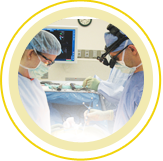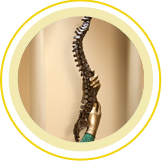What is the difference between a bulging disc and herniated disc? Bulging discs are sometimes called “slipped” discs, whereas a herniated disc can be called a “ruptured” disc. Ruptured sounds a bit more serious and, in fact, it causes more pain. That is just the first difference.
The Purpose and Make-Up of Discs
Our spine is made up of vertebrae separated by discs. They protect the spinal cord and when working properly allow for different kinds of movement like bending over or rotating.

A disc is made up of two parts:
- The annulus, or outer part, connects to each vertebra and is made of strong cartilage which protects the inner part.
- The nucleus is the inner part of the disc made up of a jelly-like substance made mostly of water and collagen.
The discs are like shock absorbers connecting the vertebrae together and allowing the spine to move freely and painlessly.
All About Bulging Discs
Bulging discs are more common than herniated ones. You may not have any noticeable pain or discomfort. However, if you do have symptoms they will include intense radiating pain down your arm or leg, numbness or tingling in your limbs, and muscle, bladder, or bowel weakness.
When you have a bulging disc, it becomes a bit flattened and “bulges” out of its normal shape and size. Think of a basketball with a large puncture in it. It will slowly flatten out and become almost like a football shape, but it doesn’t protrude out far enough to affect the nerves in your spine.
All About Herniated Discs
Herniated discs are less common, but much more painful. They occur when there is enough force to cause a crack in the hard outer layer and allow a leak of the inner nucleus through the protective covering. It leaks into and around the spinal canal causing severe pain, inflammation, and difficulty moving.
This puts significant pressure on nearby nerves.
Causes For Both Conditions
Both can be caused by degeneration as we get older. The discs become dehydrated and stiffen.
Other reasons are as follows:
- A spinal injury or trauma
- Repetitive spinal stress
- Obesity
- Genetics
- Poor posture
- Improper lifting technique
Other than aging and genetics, we can all alter our behaviors to lower the risk of developing a herniated or bulging disc.
Treating these conditions usually begins conservatively with rest, physical therapy to strengthen muscles, anti-inflammatory medications, ice and heat, and steroid injections.
If you are experiencing back pain, contact Spine & Scoliosis Specialists for a diagnosis and a treatment plan in Greensboro or High Point, NC. Call 336.333.6306 to schedule an appointment.



